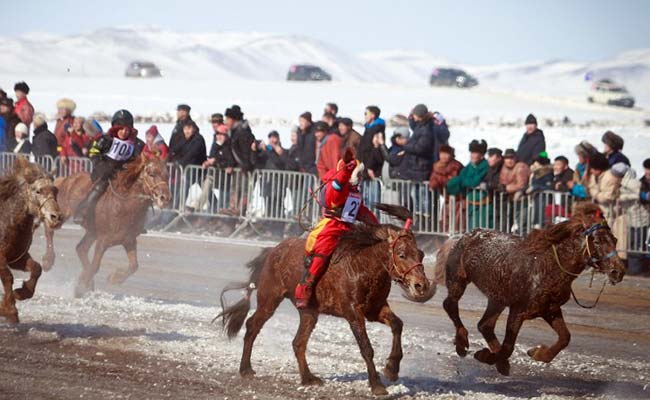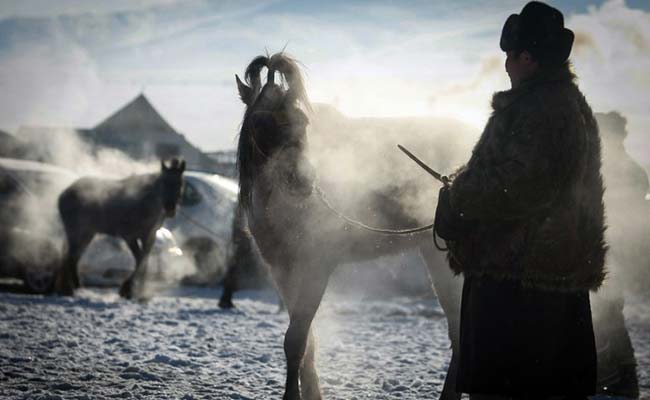
Child jockey Tsendsurengiin Munkherdene taking care of a horse outside his home in Ulziit village. (AFP Photo)
- Child jockeys face risk of crippling injury, abuse by trainers
- 326 child jockeys hospitalised due to injuries in 2012: UNICEF report
- Mongolia plans to bring in a new child protection legislation this year
Did our AI summary help?
Let us know.
Ulziit, Mongolia:
Racing their steeds across the endless Mongolian steppe, child jockeys as young as seven dream of glory and riches in a country where horses are a national passion.
Yet rights groups warn of a dark underbelly in the sport -- where vulnerable pre-teens face the risk of crippling injury and harsh treatment or even physical abuse by trainers.
Tsendsurengiin Budgarav's hopes turned into a nightmare when he was 11 and had a career-ending fall that shattered his right thigh.
His trainers denied him hospital treatment and insisted he kept quiet, he said. Infection set in but he was not operated on for a year, leaving him almost bedridden. Now 17, he is undergoing a new course of surgery to enable him to walk with crutches.
 "I felt so sorry that I fell off that day, I wish I hadn't ridden that horse," he told AFP from a hospital bed, fighting back tears.
"I felt so sorry that I fell off that day, I wish I hadn't ridden that horse," he told AFP from a hospital bed, fighting back tears.
He liked the awards and medals of his glory days, he said, but claimed his trainer "used to put out his cigarettes on my forehead like lighting a match".
"I never told my mother about it," he added.
For hundreds of years Mongolian tournaments have showcased the horsemanship skills which helped Genghis Khan's armies conquer a vast swathe of the Eurasian landmass.
Modern races are gruelling tests of stamina for the horses, far longer than even Europe's top steeplechases, so that small children are preferred as riders.
Contests became more numerous and lucrative on the back of the landlocked country's recent resources boom, offering cars and cash for prizes, with some 600 races held annually.
More than 11,000 children are registered as jockeys, according to the government's child protection agency. Some 150 participated in the main official celebrations of Naadam, Mongolia's biggest festival, in Ulan Bator.
Budgarav's mother is an unemployed disabled single parent, and the family lives on her social welfare allowance and her elderly father's pension.
To help pay medical bills after his accident, his younger brother Munkherdene began jockey training, earning a salary of about $75 a month.
Medals from races still hang proudly from carpet lining the inside of the family's tent.
But in 2013, he also fell from his horse -- suffering severe head injuries after the animal slipped on icy ground before a winter race, leaving him with persistent headaches and memory loss that prevents him from attending school.
"Since I hurt my skull... my head hurts so badly, and makes me angry," said Munkherdene, now aged 14. "Also I forget new lessons quickly."
Far from home
A 2014 UNICEF report said that some 326 child jockeys were hospitalised in 2012, mostly with head or bone injuries.
 It surveyed 529 child jockeys, with some five percent saying they had been beaten or kicked by their instructors.
It surveyed 529 child jockeys, with some five percent saying they had been beaten or kicked by their instructors.
Aspiring Mongolian jockeys leave their families and schools behind as young as seven to learn from trainers, known as "uyach" in Mongolian, who also become responsible for their education.
Critics say they have little recourse if victimised.
A source at the Mongolian National Human Rights Commission, who asked not to be named because his opinions clashed with official statements, told AFP that trainers choose boys from poor families as they are less likely to sue in the event of a dispute or injury, even if they have signed a contract.
"It is hard to live with an uyach far from home, missing family and mother," Munkherdene said, describing a gruelling daily regime of training, cleaning and maintenance work, as well as bullying by his trainer or older child jockeys.
Political race
Later this year Mongolia will bring in new child protection legislation, banning kids from winter races, in a bid to curb the number of injuries due to slippery ice-and snow-covered terrain. The law will also mandate punishments for trainers if children are injured in summer contests.
Child protection advocates have long demanded the measure, but close links between government officials and racing events mean enforcement is in question.
Mongolia's Prime Minister Chimediin Saikhanbileg approved a horse race in February where 16 children fell from their horses, two of them breaking their legs, according to the National Human Rights Commission.
In Mongolia the term "uyach" carries significant status, and also applies to racehorse owners who have others train their animals. They include members of parliament and high-profile CEOs, giving the sport powerful supporters, while politicians who own fast horses can expect a warm reception in rural areas where most voters are herders.
Dangaagiin Avirmed, head of the Mongolian United Federation for children told AFP: "The races are being held because decision makers love to watch, and their horses are there. That's why they don't cancel the race, no matter how many children got hurt."
And the sport's appeal also endures for children with few other options.
Munkherdene still hopes to return to the stables despite his head injury, nursing ambitions to become a trainer.
"I will be a good uyach who treats jockey kids with kindness and orders them to wear helmets, and pays them enough," he added.
"When I become a successful uyach, I will heal my mother and brother."
Yet rights groups warn of a dark underbelly in the sport -- where vulnerable pre-teens face the risk of crippling injury and harsh treatment or even physical abuse by trainers.
Tsendsurengiin Budgarav's hopes turned into a nightmare when he was 11 and had a career-ending fall that shattered his right thigh.
His trainers denied him hospital treatment and insisted he kept quiet, he said. Infection set in but he was not operated on for a year, leaving him almost bedridden. Now 17, he is undergoing a new course of surgery to enable him to walk with crutches.

Child jockeys competing during a winter race in Argalant district of Tov Province, in the west of Ulan Bator. (AFP Photo)
He liked the awards and medals of his glory days, he said, but claimed his trainer "used to put out his cigarettes on my forehead like lighting a match".
"I never told my mother about it," he added.
For hundreds of years Mongolian tournaments have showcased the horsemanship skills which helped Genghis Khan's armies conquer a vast swathe of the Eurasian landmass.
Modern races are gruelling tests of stamina for the horses, far longer than even Europe's top steeplechases, so that small children are preferred as riders.
Contests became more numerous and lucrative on the back of the landlocked country's recent resources boom, offering cars and cash for prizes, with some 600 races held annually.
More than 11,000 children are registered as jockeys, according to the government's child protection agency. Some 150 participated in the main official celebrations of Naadam, Mongolia's biggest festival, in Ulan Bator.
Budgarav's mother is an unemployed disabled single parent, and the family lives on her social welfare allowance and her elderly father's pension.
To help pay medical bills after his accident, his younger brother Munkherdene began jockey training, earning a salary of about $75 a month.
Medals from races still hang proudly from carpet lining the inside of the family's tent.
But in 2013, he also fell from his horse -- suffering severe head injuries after the animal slipped on icy ground before a winter race, leaving him with persistent headaches and memory loss that prevents him from attending school.
"Since I hurt my skull... my head hurts so badly, and makes me angry," said Munkherdene, now aged 14. "Also I forget new lessons quickly."
Far from home
A 2014 UNICEF report said that some 326 child jockeys were hospitalised in 2012, mostly with head or bone injuries.

A horse trainer wiping perspiration of a horse after competing in a winter race in Argalant district of Tov Province, in the west of Ulan Bator. (AFP Photo)
Aspiring Mongolian jockeys leave their families and schools behind as young as seven to learn from trainers, known as "uyach" in Mongolian, who also become responsible for their education.
Critics say they have little recourse if victimised.
A source at the Mongolian National Human Rights Commission, who asked not to be named because his opinions clashed with official statements, told AFP that trainers choose boys from poor families as they are less likely to sue in the event of a dispute or injury, even if they have signed a contract.
"It is hard to live with an uyach far from home, missing family and mother," Munkherdene said, describing a gruelling daily regime of training, cleaning and maintenance work, as well as bullying by his trainer or older child jockeys.
Political race
Later this year Mongolia will bring in new child protection legislation, banning kids from winter races, in a bid to curb the number of injuries due to slippery ice-and snow-covered terrain. The law will also mandate punishments for trainers if children are injured in summer contests.
Child protection advocates have long demanded the measure, but close links between government officials and racing events mean enforcement is in question.
Mongolia's Prime Minister Chimediin Saikhanbileg approved a horse race in February where 16 children fell from their horses, two of them breaking their legs, according to the National Human Rights Commission.
In Mongolia the term "uyach" carries significant status, and also applies to racehorse owners who have others train their animals. They include members of parliament and high-profile CEOs, giving the sport powerful supporters, while politicians who own fast horses can expect a warm reception in rural areas where most voters are herders.
Dangaagiin Avirmed, head of the Mongolian United Federation for children told AFP: "The races are being held because decision makers love to watch, and their horses are there. That's why they don't cancel the race, no matter how many children got hurt."
And the sport's appeal also endures for children with few other options.
Munkherdene still hopes to return to the stables despite his head injury, nursing ambitions to become a trainer.
"I will be a good uyach who treats jockey kids with kindness and orders them to wear helmets, and pays them enough," he added.
"When I become a successful uyach, I will heal my mother and brother."
Track Latest News Live on NDTV.com and get news updates from India and around the world

